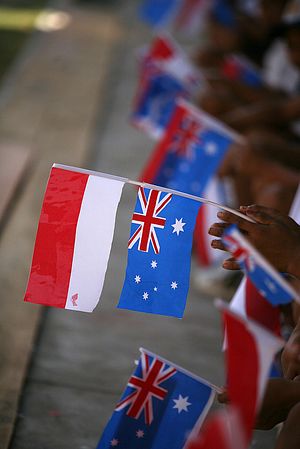Indonesian President Susilo Bambang Yudhoyono has put the Australia-Indonesia relationship on hold in response to allegations that Australia attempted to wiretap his cellphone and the phones of those close to him. The accusations, first published in the German magazine Der Spiegel, are based on documents released by former U.S. National Security Agency (NSA) consultant Edward Snowden. Upset by the allegations of Australian wiretapping, Indonesia has recalled its ambassador to Australia and suspended all military cooperation. “It is not possible that we can continue our cooperation when we are still uncertain that there is no spying towards us, spying on our soldiers,” said Yudhoyono. He further suggested that a formal “code of conduct” will be required before Indonesia can resume its military cooperation with Australia.
The breach is serious, and marks a rapid deterioration from the optimistic beginning to new Australian Prime Minister Tony Abbott’s term. Abbott visited Indonesia from September 30 to October 1; a joint communiqué issued during his visit expressed hope that he and Yudhoyono could take “the Indonesia – Australia comprehensive partnership to a higher level.” A little over a month later, those hopes have died. Far from improving the relationship, Indonesia’s foreign minister has stated that Indonesia is “downgrading Australia’s relations with us.” The Indonesian government has been extremely dissatisfied with the Australian response to date. After Abbott expressed “deep and sincere regret” for the embarrassment suffered by Indonesia, Yudhoyono tweeted that Abbott’s remarks had “belittled this tapping matter on Indonesia, without any remorse.”
The current break in Australia-Indonesia relations could potentially lead to the end of the two countries’ current defense agreement, commonly known as the Lombok Treaty. Signed in 2006, the treaty provides the basis for Australia-Indonesia defense cooperation. In addition to calling for regular consultations on defense and security issues, the treaty lists several specific areas of cooperation, including law enforcement cooperation against the smuggling of people, drugs, and arms, intelligence sharing, and counter-terrorism. After Yudhoyono’s announcement that Indonesia is cutting off cooperation in many of these fields, it’s unclear what the fate of the treaty will be.
Prior to the Snowden revelations, the bilateral military relationship between Australia and Indonesia had been progressing steadily. In 2012, the two countries signed a new Defense Cooperation Arrangement to further expand their military interactions. According to Australian Minister for Defense Stephen Smith, defense engagements between Australia and Indonesia in 2012 were at their “highest tempo… in 15 years.” On September 30, during Abbott’s visit to Indonesia, the leaders agreed to continue “close cooperation in natural disaster response, peacekeeping operations, cyber defence, maritime security, search and rescue and defence industry.” For now, at least, all such cooperation is on hold.
Indonesia-Australia relations haven’t experience so much friction since 1999. That year, Australia took part in a multinational peacekeeping force sent to quell violence in East Timor, which had just declared its independence from Indonesia. In response, Indonesia abrogated the defense treaty that then existed between it and Australia. Indonesia’s minister for political and security affairs called Australia’s actions in East Timor “inconsistent with both the letter and the spirit” of the security pact. In addition, Indonesia cancelled or postponed all official contacts with Australia. The defense relationship especially did not fully recover until 2006, when Australia and Indonesia signed the Lombok Treaty.
While no Indonesian official has made a formal statements regarding Lombok Treaty, Yudhoyono’s decision to break of military ties seems to at least temporarily put the treaty on ice. One could certainly make the argument that Australia’s alleged use of wiretapping was in violation of the agreement. It’s possible that Indonesia could once again formally abrogate its security treaty with Australia, which would have huge repercussions for the security environment in the Asia-Pacific.
Indonesia is a leading figure in ASEAN, which continues to grow in regional importance. ASEAN’s stance could help determine the final resolution of the many territorial disputes in the South China Sea, while ASEAN’s participation in free trade agreements provides much coveted economic benefits for its partners. As a result, regional powers including China, Japan, and the U.S. spend a great deal of effort trying to improve their relationship with ASEAN in general and Indonesia in particular. If the fallout from Snowden’s revelations creates a lasting rift in Australia-Indonesia defense relations, other regional players may seize the opportunity to step into the void.

































